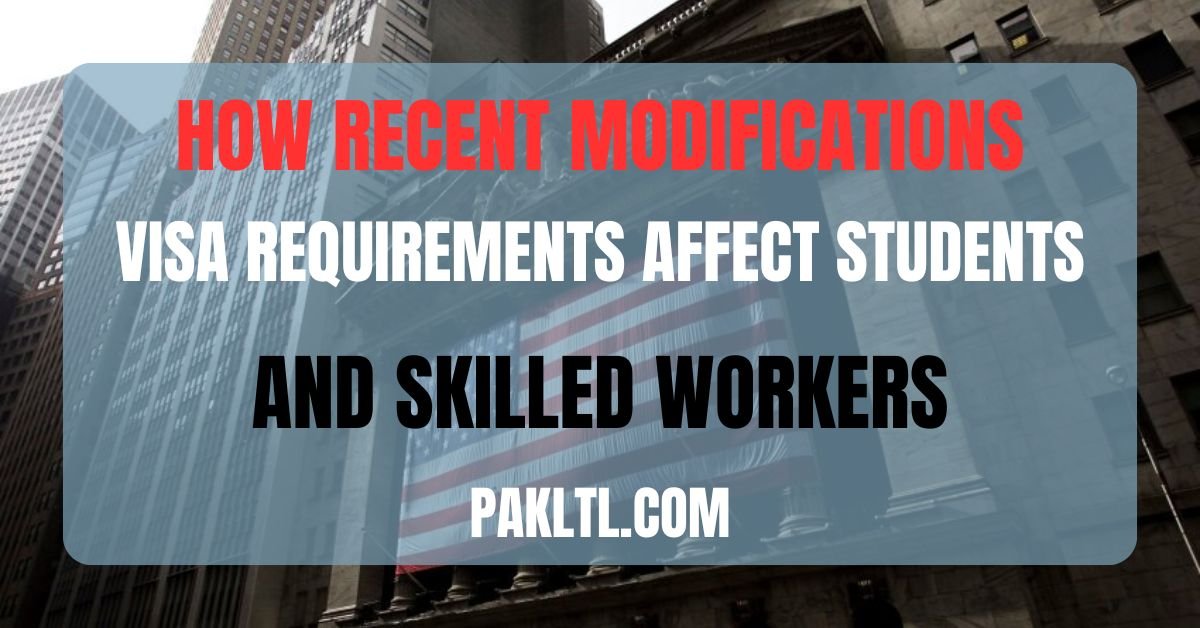Recent US Visa Requirements: A Comprehensive Guide for Students and Skilled Workers
The US has recently implemented significant modifications to its visa policies, impacting both international students and skilled workers. If you’re wondering how these changes could influence your future education or career in the US, this article breaks it down. Whether you’re an international student planning to study in the US or a professional seeking opportunities in the American job market, it’s crucial to understand how the new visa regulations affect you.
Key Changes in US Visa Requirements
The recent modifications to the US visa requirements for students and skilled workers primarily focus on tightening security, expediting processing, and reshaping eligibility criteria. The changes aim to balance the need for skilled talent with national security concerns.
Let’s explore the specific changes that students and skilled workers need to consider.
Impact on International Students: Changes to US Student Visas
Stricter Documentation and Eligibility Verification International students applying for the F-1 visa, which is essential for those seeking to study in the US, now face more rigorous documentation requirements. Visa officers are tasked with ensuring students have genuine intentions to study, meaning greater scrutiny is applied to financial documents, education history, and ties to home countries.
What this means for students: Before applying, ensure your financial statements, transcripts, and acceptance letters from US institutions are fully organized. A well-prepared application can significantly reduce the chances of visa delays or rejections.
Limited Optional Practical Training (OPT) Extensions OPT allows international students to stay in the US for up to 12 months post-graduation to gain practical work experience. For STEM students, this period can be extended to 24 months. Recent discussions have focused on tightening these extensions, especially for students in non-STEM fields.
What this means for students: Non-STEM students might find it more difficult to stay in the US after graduation. If you’re in a non-STEM field, consider career planning early, possibly focusing on internships that enhance your profile for post-study employment within your OPT timeframe.
Increased Focus on SEVIS Compliance The Student and Exchange Visitor Information System (SEVIS) is the program that tracks international students in the US. Recent changes ensure tighter monitoring and penalties for institutions that fail to comply.
What this means for students: Always maintain your student status. Pay attention to deadlines for class registration, visa renewals, and ensure you report any changes in your educational situation to both your school and SEVIS.
Changes for Skilled Workers: Navigating US Work Visas
H-1B Visa Reforms The H-1B visa, the most common visa for skilled workers in the US, has undergone notable changes. The introduction of a wage-based selection process for H-1B visas prioritizes workers with higher salaries. This means that individuals applying for H-1B jobs offering higher wages will have a greater chance of being selected.
What this means for skilled workers: Companies looking to hire skilled workers will need to adjust their offers, possibly providing competitive salaries to attract talent. For workers, this could mean negotiating higher salaries or seeking jobs in industries that offer better compensation.
Restrictions on Visa Sponsorship Several industries, particularly IT and tech, have historically relied on the H-1B program for foreign talent. However, new rules limit the ability of third-party firms to sponsor foreign workers. The government now requires companies to show that the worker will be under direct supervision and employed in specialized roles.
What this means for skilled workers: If you’re seeking a job through third-party consulting firms or outsourcing companies, it’s important to verify that the employer can provide strong evidence for direct employment and supervision.
Employment Authorization Documents (EAD) Delays For skilled workers on visas such as H-1B, L-1, and O-1, Employment Authorization Document (EAD) renewal delays have been a major challenge due to backlog and processing issues. Although the US government has promised to speed up these processes, current delays persist.
What this means for skilled workers: Plan ahead. Start the renewal process for your work authorization as early as possible, ideally six months before the expiration, to avoid employment interruptions.
How These Changes Affect Your Future
For International Students
While studying in the US continues to be a valuable opportunity, the recent changes mean students need to be more strategic. With increased scrutiny on visa applications and limitations on post-graduate work opportunities, it’s essential to plan your education and career trajectory well in advance.
For Skilled Workers
The US remains a hub for talent, particularly in fields like tech, engineering, and healthcare. However, securing a work visa may become more competitive, especially with the introduction of wage-based H-1B allocations. Skilled workers should focus on roles with higher pay and more specialized skill requirements.
Preparing for the Future: Tips for Students and Skilled Workers
- Stay Updated: Changes to US immigration policies happen frequently. Regularly check official government websites or consult an immigration lawyer to stay informed.
- Build a Strong Case: Whether you’re applying for a student or work visa, ensure that all your documents are in order and highlight your qualifications and financial stability.
- Consider Alternative Pathways: If the new US visa requirements make it difficult to enter or remain in the country, consider alternative pathways such as applying to other countries with more flexible immigration policies or seeking remote work opportunities.
Final Thoughts
Recent modifications to US visa requirements have created new challenges but also present opportunities for those who are well-prepared. International students and skilled workers can still find pathways to success in the US, but it requires diligence, awareness of policy changes, and proactive career planning. Whether you’re aiming for academic success or professional growth, understanding these changes will be crucial to your journey.
Share this Article:
Encourage others to stay informed by sharing this article on [Facebook], [Twitter], and [Pinterest].By keeping up-to-date with the latest visa regulations, you can make well-informed decisions about your education and career in the US.
